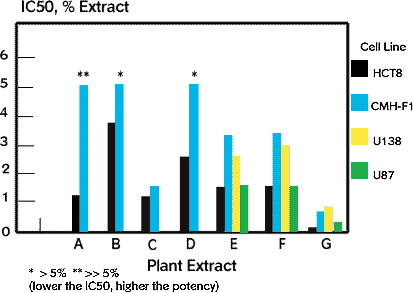|
|
|
Close Help | ||||||||||||||
Next Page 1 2 3
Initial cytotoxicity assays of plant extracts A-G showed variation in potency. Fig. 1 shows a representative experiment for HCT-8 cells. Plant extract G was clearly the most cytotoxic, IC50 of about 0.2%. FIGURE 1. Cytotoxic effects of plant extracts on HCT-8 colon tumor cells Cell growth (Abs)  Plant extracts A, C, E and F had moderate activity, IC50 at about 1% plant extract. Plant extracts B and D were least cytotoxic at IC50 of about 2.5%.
 All plant extracts were tested in at least HCT8 tumor cells and normal fibroblasts. Plant extracts E, F and G were also tested in all 4 cell lines including U138 and U87 gliomas. Plant extract G was much less toxic to CMH-F1 fibroblasts and U138 glioma. In other recent experimental chemotherapy studies, we are finding that U138 glioma cells are highly resistant to the plant-derived anticancer drug, etoposide. Similar results were seen for plant extracts E and F. Although plant extract A was moderately cytotoxic to HCT8, it was exceptionally inactive against fibroblasts. Further experiments were conducted with plant extracts A, F, G and H in two fibroblasts cell lines. The following information is in abridged format
Cytotoxic effects of plant extracts in non-tumor CMH-F1 skin fibroblasts cells:
Cytotoxic effects of plant extracts in multi-drug resistant SW1573-2R160 lung cancer cells: |
| *The name, "Alzium", has been changed to Alsihum due trademark issues. No change has been made to the patented product formula. |